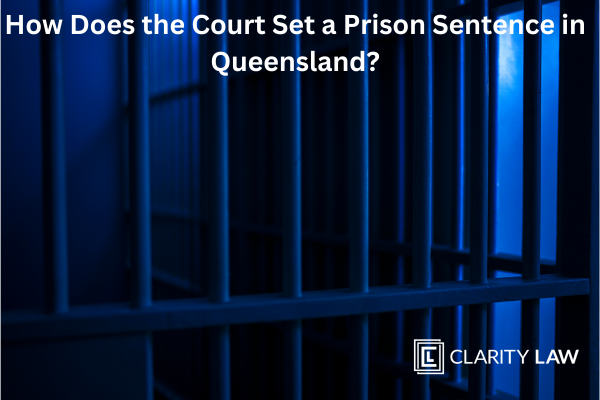
When imposing a prison sentence, a Queensland Court has two primary discretions. The first is to decide the length of the sentence, and the second is to set the release or eligibility date.
The basic structure of prison sentences
A prison sentence might be “six months imprisonment to be released on parole after having served two months”. This means that the prison sentence is six months, and the person is released from custody after two months. The remaining four months will be served on parole. Alternatively, the Court may order that the person serves four years to be eligible for parole after two years.
The two parts, then, are the length of the sentence, and then a parole release or parole eligibility date some time before the end of the sentence.
Setting length of the sentence
Sentencing in Queensland is a complex procedure in which the Court must consider many things, including:
-
The sentencing principles in the Penalties and Sentences Act;
-
Relevant case law (previously decided cases);
-
the maximum penalty of the offence;
-
the penalty submissions made by the prosecution;
-
the penalties submissions made by the defence;
-
the personal circumstances of the defendant;
-
the circumstances of the offence;
-
any victim impact statement;
-
the impact the offence had on an individual or the public generally;
-
any time in custody the defendant has already served before the sentence and;
-
the criminal history of the defendant.
As can be seen, there is a lot for the Court to consider.
The Queensland Supreme Court has said that sentencing is not a mathematical exercise. Judges and magistrates have a wide discretion in deciding how to impose a sentence. The primary approach is called an “instinctive synthesis”.
In practice, most judges and magistrates are likely to stay within the “range” of previously decided cases. “Range” means the upper and lower limits of the usual sentences imposed for a given offence. For example, a court is likely to impose a penalty of 18 months or more for drug trafficking. This is because most cases show sentences of 18 months imprisonment or more for that offence.
Setting the Release Date
It is rare for a defendant to serve the whole of the length of his prison sentence in custody. He will usually have the opportunity of parole.
As a general rule, a person who pleads ‘guilty’ to an offence will be released or eligible after serving approximately 1/3 of his or her sentence. A person who pleads ‘not guilty’ and loses the trial, will generally be released or eligible after 1/2 of the sentence.
The longer the sentence, the more difference this makes. The difference between 1/3 or 1/2 of six months is one month. The difference between 1/3 or 1/2 of five years is 10 months.
Release Date or Eligibility Date
When a court is deciding when to release a person on parole, it will impose either a “parole release date”, or a “parole eligibility date”.
A parole release date means the Court chooses the date of the defendant’s release. This can be anywhere from the first day of the sentence to the last day.
If the Court does not impose a release date, it will be an eligibility date. This means the Court will set the date for when the defendant is eligible to apply for parole. The defendant applies to the Parole Board for release. It is the Parole Board who decides his release date, as opposed to the Court. The parole board has up to 120 days after the prisoner’s parole application to decide whether to release the prisoner or not. The Parole Board may defer the decision to gather further information, in which case it has 150 days to decide. So, while the prisoner can apply for parole, it may not be granted for up to 150 days after his application.
What is the Most important factor for sentencing?
In our experience, every case is different, and no one case will necessarily be decided in the same way as another. However, the factors below will always be relevant.
The seriousness of the offence. This refers to how seriously the offence is considered at law. A person convicted of murder is always going to do jail time, regardless of every other factor, because of how serious the offence is. A person convicted of possessing a pipe to smoke drugs, however, is almost never going to be sentenced to jail. This is because the offence is not serious enough to warrant actual imprisonment.
Criminal history is a big factor. A person may commit an offence which is not especially serious, but because of his criminal history, it becomes serious. Breaching a domestic violence order is a common example of this. The breach itself may not be overly serious, but because the person has been sentenced for breaching domestic violence orders many times in the past, the Court may consider it has no other option but to impose actual imprisonment.
As outlined earlier, a court will consider previous cases which are similar to the one before it, and attempt to impose a sentence within those bounds. This is for the purpose of (among others) consistency. It would be unfair for one person to get a wildly different penalty from another person for the same offence.
Conclusion
This article is only an introduction to sentencing. We highly recommend if you are charged with any offence, let alone a serious one, that you engage experienced criminal law experts. Clarity Law can give you the individual advice and support you need to make the right move.
Why should I engage Clarity Law?
Quite frankly we care about getting the right outcome for our clients and helping them through one of the most difficult times in their lives.
In the face of a criminal law charge, selecting the right legal representation is paramount, and Clarity Law offers a unique blend of proficiency and empathy that sets us apart. Our firm is dedicated to providing clarity in the often complex world of criminal law. We believe that every client deserves a clear understanding of their rights and the legal process they're navigating.
Our experienced team of lawyers approaches each case with a commitment to open communication, ensuring you're informed every step of the way. With a proven track record of securing favourable outcomes, we have the expertise to navigate even the most intricate legal challenges.
At Clarity Law, we strive not only to be your staunch advocates but also to provide a supportive, understanding environment during this trying time. Choosing Clarity Law means choosing a team that will tirelessly work to protect your rights and pursue the best possible outcome for your case.
You can read more about our founder, Steven Brough’s, journey to starting Clarity Law by clicking here.
How do I get more information or engage you to act for me?
If you want to engage us or just need further information or advice then you can either;
-
Use our contact form and we will contact you by email or phone at a time that suits you
-
Call us on 1300 952 255 seven days a week, 7am to 7pm
-
Click here to select a time for us to have a free 15 minute telephone conference with you
-
Email This email address is being protected from spambots. You need JavaScript enabled to view it.
-
Send us a message on Facebook Messenger
-
Click the help button at the bottom right and leave us a message
We are a no pressure law firm, we are happy to provide free initial information to assist you. If you want to engage us then great, we will give you a fixed price for our services so you will know with certainty what we will cost. All the money goes into a trust account monitored by the Queensland Law Society and cannot be taken out without your permission.
If you don’t engage us that fine too, at least you will have more information on the charge and its consequences.
Other articles that may be of interest






